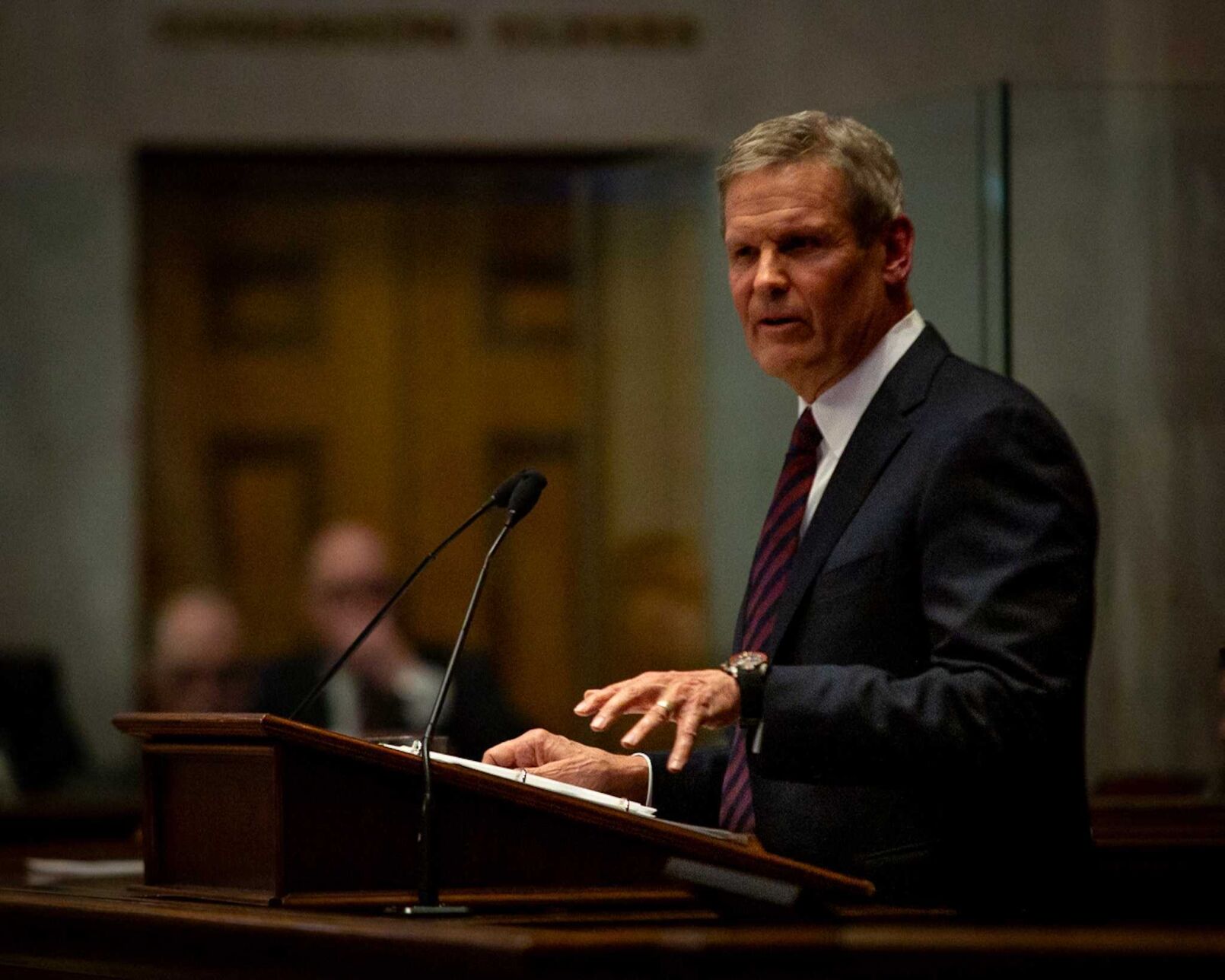Gov. Bill Lee on Monday delivered his annual State of the State address to gathered lawmakers, with his 2024-25 budget proposal defined by more than $1 billion in planned tax refunds for corporations and a projection that years of annual revenue growth have come to an end.
The governor's most significant policy proposal for the year is his Education Freedom Scholarship Act, unveiled late last year. The program would fund voucher-like scholarships for up to 20,000 Tennessee students next year, with unlimited growth planned for the years to follow. The program is expected to trigger substantial debate among lawmakers and could see changes from Lee's initial proposal.
The overall spending plan totals $52.6 billion, down from $62.5 billion in the current year. State officials said the decrease was due to expiring federal funds stemming from COVID-19 response and infrastructure spending, plus a drop in one-time state funds.
“I’ve got three years left, and yet there is a lot to do," Lee said. "We’re not slowing down — not for a second. ... So, in 2024, and frankly for the remainder of my time in office, I believe our job is to fortify that which has been built over the years, and to remember the work it took to get here.”
Jim Bryson, commissioner of the Tennessee Department of Finance and Administration, said Monday that the state has gone "from high growth to basically no growth" and is "facing significant financial challenges." He credits "conservative fiscal management" for helping the state stave off unplanned budget cuts or deployment of reserves.
"This budget is more challenging than previous budgets and in many ways a lot less exciting," Bryson said, while adding that the budget continues to increase funding for key priorities like education and law enforcement.
The tax refunds are a preemptive effort to avoid a lawsuit from companies that could challenge the state's franchise tax regime. The refunds would go back up to four years and are expected to cost the state more than $1 billion the coming fiscal year. Foregone revenue from changes to the tax will cost the state hundreds of millions of dollars more annually. The budget includes no grocery sales tax holiday, though Democrats have proposed eliminating the tax entirely.
“Our members are having a very favorable reaction to the governor’s franchise tax proposal,” said Jim Brown, state director for the National Federation for Independent Business. “We also are gathering feedback from the tax practitioner community and sharing with state leaders to ensure the proposal’s implementation would go smoothly.”
State leaders return to Nashville to consider laws related to abortion, education and the ongoing culture wars
As proposed, the budget includes $6.8 billion for K-12 education, the most ever. That figure represents an increase of nearly $500 million from the current year, Bryson said, and includes funding for ongoing priorities like the progressive increase of teacher salary floors to $50,000. The education budget proposal also includes $15 million for charter school facility support and more than $140 million for the first year of the education freedom scholarships.
A few dozen mostly student protesters gathered outside the state Capitol ahead of the speech, rallying against the voucher-like expansion proposal and for gun safety measures. Opponents of the private school scholarships in the audience interrupted Lee's speech at times to voice their criticisms.
“We the students are here to say we are unsatisfied with the state of the state and we’re ready to make a change," said Emmie Wolf-Dubin, a sophomore at Hume-Fogg High School in Nashville. "The status quo is fundamentally un-maintainable as we whitewash our history and cleanse our books of the American wrongs."
Various interest groups also weighed in.
"We will always seek to find common ground with policymakers as long as the policy aligns with the needs of children and educators in our public schools," said JC Bowman, executive director of Professional Educators of Tennessee. "The concept of universal vouchers would be costly to the state, and we urge the Tennessee General Assembly to move slowly. In particular, we have concerns over the lack of income-eligibility requirements and accountability. Our state must avoid any program viewed as a tax subsidy for existing private school families or a tax bailout for struggling private schools."
Said Lee: "We can give parents choice and support public schools at the same time."
Lee also highlighted a proposed investment in rural health initiatives, TennCare growth and support for behavioral health care. The governor is also asking for more than $17 million in order to add 60 troopers to the Tennessee Highway Patrol.
Lee is also proposing an additional $71.5 million for the Heritage Conservation Trust, $25 million for the Farmland Conservation Trust, $20 million for river access and $10 million for a Bill Dance Signature Lakes Fishing Trail.
Though he offered few details, Lee also said he would push statewide permitting reform "to accelerate building times, lower costs and safely streamline construction in Tennessee." The effort is designed to make it easier to build homes, businesses and child care facilities, he said, and comes as Metro councilmembers begin a campaign for zoning and codes reforms in Nashville with similar aims.
Sen. London Lamar (D-Memphis), chair of the Senate Democratic Caucus, offered a "prebuttal" to Lee's State of the State on behalf of Tennessee Democrats, confined to the superminority in both the House and the Senate.
"Instead of working on the issues holding us back, Republicans have used their power to seize wealth for their campaign contributors and made cuts that hurt working people," she said. "They’ve wasted years of our time and tax dollars in pursuit of a trickle-down agenda that serves billionaires and big corporations while literally undermining our personal prosperity, our safety and our freedom."
Hamilton Matthew Masters contributed reporting.






